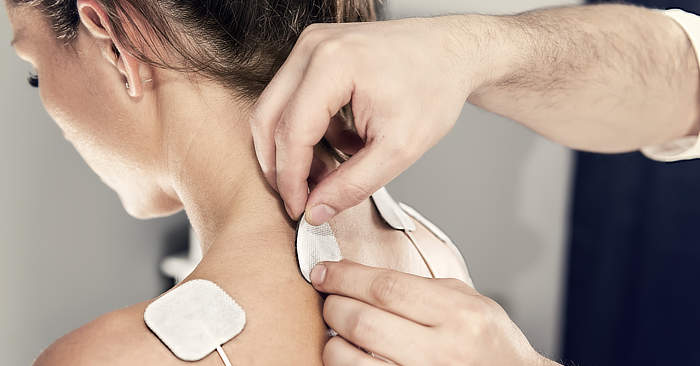|
|
 |
Curious About TENS Units? Here's Everything You Need to Know |
|
|
|
 |
|
 |
TENS Unit
A transcutaneous electrical nerve stimulation (TENS) unit is a battery-powered device that is used to treat pain. TENS units work by stimulating small electrical impulses with electrodes that stick to the body using adhesive pads. Electrical impulses impede the transmission of pain signals to the spinal cord and brain, significantly reducing the central nervous system's ability to send alerts. The same electrical impulses also activate the body to make naturally occurring pain-relieving compounds referred to as endorphins. Read this article to learn more about the uses of a TENS machine and the research on its effectiveness.

Uses:
TENS units may help treat the following symptoms:They may also alleviate the pain that results from the following conditions:A TENS machine is equipped with controls that allow individuals to develop the appropriate level of pain relief. This can be done by altering the following components of a current.
Intensity: A dial enables you to adjust the intensity of the electrical stimulation.
Frequency: The frequency of electrical pulses refers to the number of pulses per second. High-frequency (HF) pulses range between 80 and 120 pulses per second and may offer comfort in the event of acute pain. Low-frequency (LF) pulses range between 1 and 20 pulses per second and may be used for the elimination of chronic pain.
Duration: The duration of the pulse is the number of microseconds it takes for the current to enter the nearest part of the skin during each pulse.
Benefits
TENS is a non-invasive way to alleviate pain. Individuals who experience pain relief through TENS might reduce or completely eliminate their dependence on pain medications, some of which might be addictive or cause unpleasant side effects. TENS units are useful for their portable, small-scale, and discrete design. People often carry them in their pockets or check them out with a belt or clip, making it simple for them to get them whenever they experience pain.

If the adhesive pads cause redness or irritation, hypoallergenic pads are available.
A TENS unit can safely be used by most people, and they usually do not experience any significant side effects. However, TENS unit electrical impulses may cause a buzzing or tingling sensation, which many individuals find uncomfortable. Some people may be allergic to adhesive pads. Anyone who develops skin reddening and irritation can utilize hypoallergenic pads instead.
It's vital never to place electrodes on just the front of the neck, or on the eyes. Placing electrodes on the neck could lower blood pressure or cause spasms, and on the eyes, it can drive pressure within the eye and cause an injury.
When is TENS not right for you?
Even though it is safe for most people, doctors recommended that you should avoid TENS treatment unless a doctor suggests its use in your case.
This recommendation applies to the following people:- Pregnant women: Pregnant women should avoid using TENS in the abdominal and pelvic regions.
- People with epilepsy: Applying electrodes to the head or neck of people with epilepsy may induce seizures.
- People with heart problems.
- People with a pacemaker or another type of electrical or metal implant.
Does it really work?Research has not yet verified whether TENS is a valid treatment for pain. One research indicated that TENS therapy provided temporary pain relief for people with fibromyalgia while the machine was used. There is inadequate scientific evidence to support TENS' effectiveness, but there are many people who find this to be an effective tool. Several factors may influence the effectiveness of TENS:
ToleranceResearch has demonstrated that TENS units can be used every day at the same frequency and intensity to develop a tolerance to the therapy. People who develop tolerance to units will no longer feel the same level of pain relief that they did before the first treatment. To prevent this from occurring, people should intermittently alternate between low and high-frequency TENS during treatment. Alternatively, they can gradually increase the intensity or duration of TENS on a daily basis.Stimulation intensityThe range of intensities of the electrical stimulation may account for some of the variations in research findings. Findings from a 2014 review indicated that HF TENS is more successfully treating pain than LF TENS is. In fact, several studies are finding that LF TENS is unsuccessful. Since HF TENS appears to be a more effective remedy, experts advise that patients use the highest intensity TENS machinery that they can tolerate.Electrode placementIt may be more effective for people to place the electrodes for TENS at one's acupuncture points to feel the stimulation. Acupuncture is a science that uses the vascular nodes acupoint to induce physical or physiological reactions. Specialists believe that this procedure generates endorphins.
How long does pain relief last?

The intensity of an individual's pain relief can differ after using a TENS unit. Some people report that the pain returns as soon as they turn off their device, while some people have experienced an adequate level of pain relief for up to 24 hours.
Takeaway
Research suggests that TENS therapy may help alleviate some pain, but the manner in which this is carried out depends upon certain variables, such as the affected region as well as the intensity of the treatment. Knowing these factors can help people carry out TENS therapy more proficiently. Most individuals can use a TENS unit safely, and few will experience side effects. Nevertheless, it is wise to make an appointment with your doctor before using TENS either as a treatment or in combination with additional methods of pain treatment.
TENS units are available for purchase at Pro Therapy Supplies. You can visit our website or call us at 7870-441 9808.
|
|
|
|
|